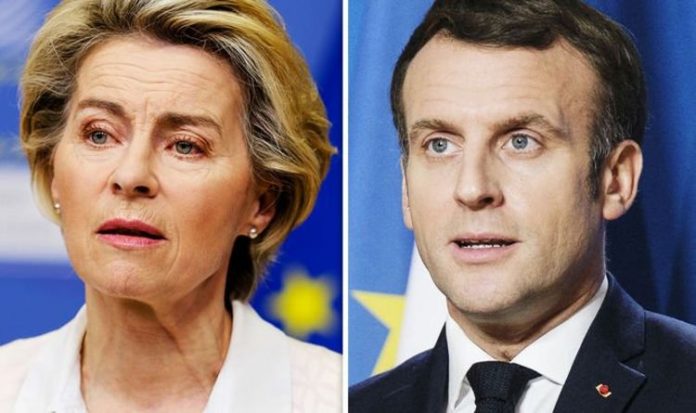Mr Macron is once again being extremely intransigent with Britain. Earlier this month, the two sides were said to be extremely close to reaching an agreement until several EU member states, spearheaded by France, raised serious doubts about the direction of the talks. According to senior political sources, because Mr Macron is facing domestic threats to his re-election, he would rather see the talks fail than agree to a bad deal that could tempt other EU states to leave the bloc.
Europe’s power to protect itself from major global rivals, pandemics, economic crises, migration and climate change will be a major electoral argument for Mr Macron as he gears up for his 2022 re-election bid, most likely against National Rally leader Marine Le Pen, who he defeated in 2017.
A source said: “France’s stance is to show that Brexit cannot be a success.
“From that point of view, the prospect of no deal is not necessarily a problem.”
The claims come as Mr Macron’s close aide Clément Beaune recently warned that France will veto a “bad” post-Brexit trade deal.
As the clock ticks down and tensions rise, in an exclusive interview with Express.co.uk, Alan Winters, director of the Trade Policy Observatory at the University of Sussex, explained how President of the European Commission, Ms von der Leyen could convince the French leader to back down.
Professor Winters argued “swapping senior jobs” might be key to solving the impasse, as it has been done before.
He said: “Many trade agreements over the last 30 years have had the splits we are seeing now.
“And they had to be settled through internal politics.
“It has almost always been France saying: ‘We don’t like this, we want to veto it’.
“They have been resolved in different ways.
“For example, the swapping of senior jobs was involved.”
But there have been cases, Mr Winters noted, where the French were so stubborn, such as in 1994 with audio-visuals services, that Brussels had to cave in.
JUST IN: Brexit chief Frost said UK ‘will have to inherit EU’s trade rules’
The trade expert added: “The EU never negotiates audio-visual services because the French don’t allow it and the EU has to exclude that.
“Basically, Paris wasn’t prepared to have Hollywood undermine French culture.”
As Professor Winters explained, France has long been a champion of “cultural exception”, or “cultural diversity”, battling most recently for it to be upheld in the long-mooted, yet-to-be-agreed EU-US Transatlantic Trade and Investment Partnership (TTIP) trade deal, negotiations for which are reportedly on ice.
The country first introduced the concept of cultural exception during the 1993 negotiations around the General Agreement on Tariffs and Trade (GATT), which was succeeded by the World Trade Organisation rules in 1995.
Under the principle, cultural goods and services are treated differently from other commercial products, giving countries free rein to support and protect their own cultural sector as they see fit, through subsidies, quotas or obligations.
Last year, Mr Macron confirmed France would have ensured the European audiovisual sector was excluded from any all-encompassing UK-EU free trade agreement (FTA) post-Brexit.
DON’T MISS:
EU feared Brexit talks were being bugged by UK secret agents [INSIGHT]
Sturgeon to get ‘taste of her own medicine’ with Shetland Islands [ANALYSIS]
Brexit deadlock between UK and EU ‘very strange’ – expert [EXCLUSIVE]
Mr Macron laid out France’s position in a letter responding to written concerns expressed by the lobby group, the French Coalition for Cultural Diversity.
Mr Macron wrote: “France has always stood by the exclusion of audiovisual services from FTAs. It’s a key issue, for the protection of cultural diversity, on which the Council [of Europe] is unanimous.
“Our country has made this a major point in every commercial negotiation and has secured the exclusion of audiovisual services from all the free trade deals concluded by the European Union.”
He said France would demand “an explicit mention” of the exclusion of audiovisual services in any directives adopted by the EU Commission within the framework of a future FTA between the EU and UK.







